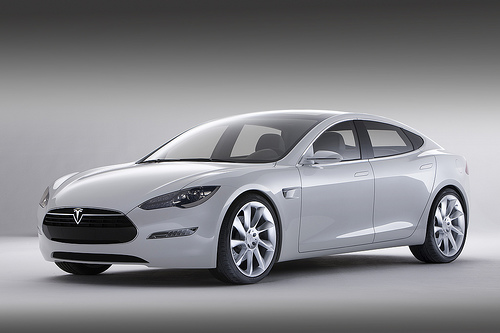Dunno if this is the right place to post this, but had to share my despair with someone!
http://www.telegraph.co.uk/motoring/news/7471643/Nissan-Leaf-to-be-built-in-UK.html

When I was a kid I (long time ago) I used to see electric cars on Tomorrows World, but they were all a bit rubbish, but there was a promise of great things in the future, which I looked forward to, and I still think decent electric vehicles are desirable so I support it generally.
Now, it's nice to know that the UK will be producing the new electric car from Nissan, but I wonder just what planet these people are on when they talk about the range etc.
It's an average looking family car, but with these figures;
The Leaf is based on a special electric vehicle chassis and will have an average range of 100 miles and a top speed of 90mph, which Nissan claims will be sufficient for more than 90 per cent of UK car customers' daily journeys.
It also claims that the Leaf will be able to be recharged to more than 80 per cent of its capacity in just 30 minutes at special high-current charging stations
...Well that's just great - you can legally do 70mph on UK roads, so expect a range of about 120 miles. Factor in the recharge time, and hoping that there will be recharge points at suitable intervals to your destination (high charge sites = 80% capacity, but what about on a 'normal' plug??!) and I reckon that a 350 mile journey will take approx 7 hours. And if it's cold, dark and rainy, your car is loaded up for a holiday, and you fancy using your satnav and listen to music on that journey, then the batteries are going to be drained at a higher rate anyway.
I would say that a trip down to Cornwall from London would take, at best, about 9 hours.
Unless you only intended to use it around town, in which case you'd need a second car anyway (probably petrol) for those family holidays.
I wonder if Nissan will offer to exchange the weedy lithium-ion batteries for shinybright lithium-ion polymer units once they become fully available?.......
It's certainly no Tesla Model S, that's for sure!
http://www.teslamotors.com/

(Oh BTW it did also occur to me that if you were feeling particularly nutty in the 'Leaf' you could spank it, flat out up the motorway on a full charge, but only for about 45 minutes before 'low charge' warnings start appearing)
http://www.telegraph.co.uk/motoring/news/7471643/Nissan-Leaf-to-be-built-in-UK.html

When I was a kid I (long time ago) I used to see electric cars on Tomorrows World, but they were all a bit rubbish, but there was a promise of great things in the future, which I looked forward to, and I still think decent electric vehicles are desirable so I support it generally.
Now, it's nice to know that the UK will be producing the new electric car from Nissan, but I wonder just what planet these people are on when they talk about the range etc.
It's an average looking family car, but with these figures;
The Leaf is based on a special electric vehicle chassis and will have an average range of 100 miles and a top speed of 90mph, which Nissan claims will be sufficient for more than 90 per cent of UK car customers' daily journeys.
It also claims that the Leaf will be able to be recharged to more than 80 per cent of its capacity in just 30 minutes at special high-current charging stations
...Well that's just great - you can legally do 70mph on UK roads, so expect a range of about 120 miles. Factor in the recharge time, and hoping that there will be recharge points at suitable intervals to your destination (high charge sites = 80% capacity, but what about on a 'normal' plug??!) and I reckon that a 350 mile journey will take approx 7 hours. And if it's cold, dark and rainy, your car is loaded up for a holiday, and you fancy using your satnav and listen to music on that journey, then the batteries are going to be drained at a higher rate anyway.
I would say that a trip down to Cornwall from London would take, at best, about 9 hours.
Unless you only intended to use it around town, in which case you'd need a second car anyway (probably petrol) for those family holidays.
I wonder if Nissan will offer to exchange the weedy lithium-ion batteries for shinybright lithium-ion polymer units once they become fully available?.......
It's certainly no Tesla Model S, that's for sure!
http://www.teslamotors.com/

(Oh BTW it did also occur to me that if you were feeling particularly nutty in the 'Leaf' you could spank it, flat out up the motorway on a full charge, but only for about 45 minutes before 'low charge' warnings start appearing)

